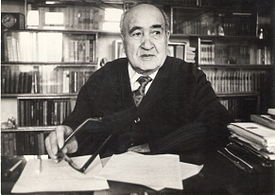|
Nado Makhmudov
BiographyEarly yearsNado Makhmudov was born on January 1, 1907, in the village of Gharanlugh, now Martuni, in Armenia. Nado's mother, Tare, was of noble birth. She came from the family of a wealthy Kurdish landowner (bey) but, due to an illness that disfigured her face, she was forced to marry a shepherd named Khdo. After losing his father at the young age of 10, Nado became a duazho (a shepherd's aid) in order to feed his mother and his little sister, resulting in a difficult childhood. While Nado's dream was to become an educated person, he was instead forced to tend the cattle from morning to night and work in the house of a wealthy landlord. In exchange for his work and obedience, Nado was permitted to sit in the corner of the room during the private lessons of the landlord's son, and follow along. This way the little duazho learned to read and write, and came closer to realizing his dream of getting an education. In the aftermath of the Russian Revolution it became possible for young, talented and active men of the people, be it a Kurd or an Armenian, to receive a free education. Makhmudov was an active member of a working youth organization, so he received the opportunity to study in Alexandropol (now Gyumri) in the High (Communist) Party School. He graduated from the Transcaucasian Party University and from the High Party School in Moscow. In addition to his Party education, Nado also received a university education and graduated from the History department of the Yerevan State University.[1] CareerThrough the 1920s and until the very end of his life, Makhmudov lead an active political and social life, holding numerous high governmental positions: he was the head of several regions of Armenia during different periods of time. He was the minister of the municipal economy and head of the cotton trust of Armenia, as well as the deputy minister of transport.[2] He was elected several times as a deputy to the legislatures of the USSR and Armenia. For his great achievements and contributions, he received high national awards. Throughout his life Nado Makhmudov acted for the good of his Kurdish people as well. He played a leading role in the establishment of Kurdish schools, a Kurdish newspaper (Ria Taza), Kurdish broadcasting on Armenian radio, and in the development of Kurdish culture and literature. In addition, he was focused on the strengthening of Armenian-Kurdish literary and social ties.[3] Delving deeply into questions of the past and present of Kurdish people, he published articles in various newspapers and magazines about issues that concerned his compatriots. While in the USSR, Mustafa Barzani expressed a wish to meet him.[4] Their meeting took place in Armenia, at Makhmudov's home.[5] Literary worksMakhmudov was not only a statesman and a public figure but a writer as well. In 1959 Makhmudov published his monograph "Kurdish People", about the history of the Kurdish people beginning with their ancient history and leading up to the present. This monograph remains an important source for orientalists. Makhmudov is also an author of numerous stories, tales, essays and memoirs, which were published in Kurdish, Armenian and Russian. They were warmly received by readers from Armenia, as well as those outside of the country. Among Makhmudov's friends were distinguished Armenian writers and poets such as Avetik Isahakyan, Derenik Demirchian and Nairi Zarian.[6] Honours and awards
Books
Short stories
References
|
||||||||||||||||||||||
